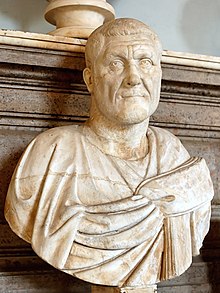Maximinus I (Thrax)
| Maximinus Thrax | |||||
|---|---|---|---|---|---|

Bust of Maximinus Thrax
in Capitoline Museums, Rome |
|||||
| 27th Emperor of the Roman Empire | |||||
| Reign | 20 March 235 – early May 238 | ||||
| Predecessor | Severus Alexander | ||||
| Successors | Pupienus and Balbinus | ||||
| Born | c. 173 Thrace or Moesia |
||||
| Died | May 238 (aged 65) Aquileia, Italy |
||||
| Wife | |||||
| Issue | Gaius Julius Verus Maximus | ||||
|
|||||
| Father | Unknown, possibly Micca | ||||
| Mother | Unknown, possibly Ababa | ||||
| Full name | |
|---|---|
| Gaius Julius Verus Maximinus Augustus |
Maximinus Thrax (Latin: Gaius Julius Verus Maximinus Augustus; c. 173 – May 238), also known as Maximinus I, was Roman Emperor from 235 to 238.
Maximinus is described by several ancient sources, though none are contemporary except Herodian's Roman History. He was a so-called barracks emperor of the 3rd century; his rule is often considered to mark the beginning of the Crisis of the Third Century. He died at Aquileia whilst attempting to put down a Senatorial revolt.
Most likely Maximinus was of Thraco-Roman origin (believed so by Herodian in his writings). According to the notoriously unreliable Augustan History (Historia Augusta), he was born in Thrace or Moesia to a Gothic father and an Alanic mother, an Iranian people of the Scythian-Sarmatian branch; however, the supposed parentage is highly unlikely, as the presence of the Goths in the Danubian area is first attested after the beginning of the Crisis of the Third Century. British historian Ronald Syme, writing that "the word 'Gothia' should have sufficed for condemnation" of the passage in the Augustan History, felt that the burden of evidence from Herodian, Syncellus and elsewhere pointed to Maximinus having been born in Moesia. The references to his "Gothic" ancestry might refer to a Thracian Getae origin (the two populations were often confused by later writers, most notably by Jordanes in his Getica), as suggested by the paragraphs describing how "he was singularly beloved by the Getae, moreover, as if he were one of themselves" and how he spoke "almost pure Thracian".
...
Wikipedia
